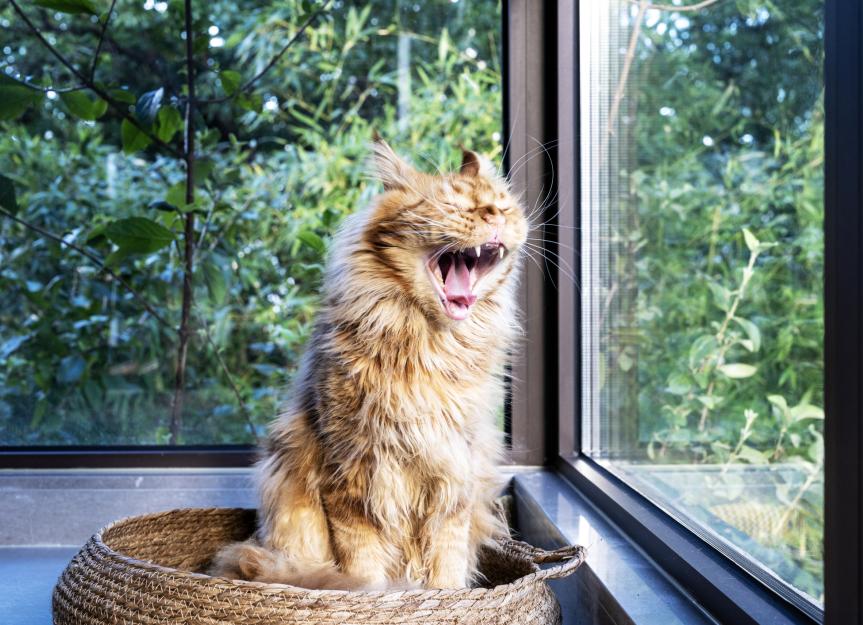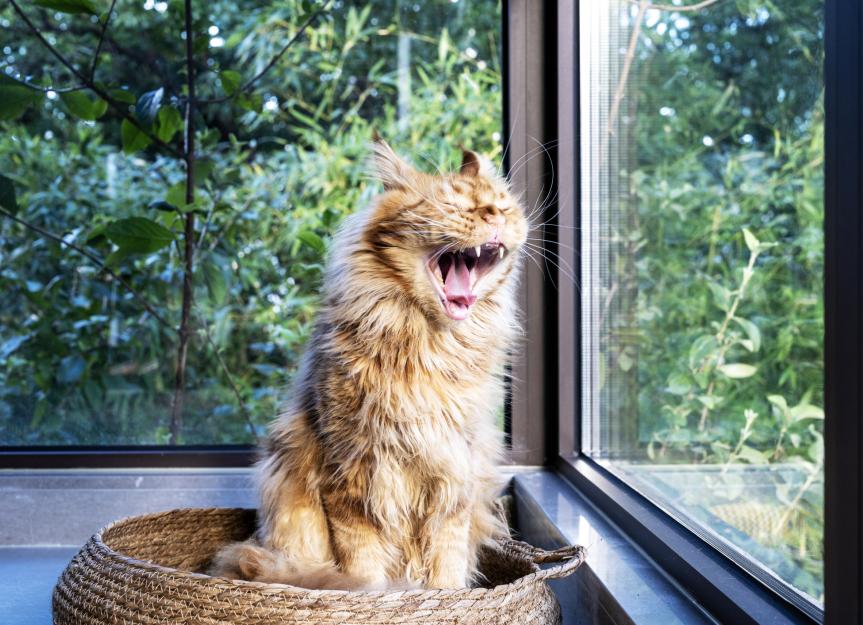
Cats cough to expel an irritant in their airways or because of inflammation or underlying disease. Various causes can contribute to cat coughing, including infections, allergies, or foreign objects.
When your cat has a cough, schedule a veterinary appointment to determine the underlying cause and appropriate treatment plan.
Some causes of coughing can be emergency situations, while others may require long-term management for relief.
Key Takeaways
- Coughing in cats is a reflex that can signal anything from minor irritants to serious health conditions.
- Common causes of cat coughing include bronchitis, heartworm, allergies, asthma, and infections.
- Seek emergency vet care if coughing is accompanied by symptoms like bluish gums, lethargy, or blood-tinged mucus.
- Treatments vary and may include antibiotics, anti-inflammatories, bronchodilators, anti-parasitics, or even surgery, depending on the cause.
What Is Cat Coughing?
Coughing in cats is a reflex used to clear the airway of something that is causing irritation or inflammation.
Cat coughing is a symptom of an underlying issue, which may range from mild to severe. Cat coughing is relatively common, but it can be more subtle or difficult to notice than the cough we experience when we have a cold.
When a cat coughs, it can sound different depending on the underlying cause.
For example, cat coughs can range from dry and hacking to wet or wheezy. Pet parents may have trouble telling the difference between a cough and reverse sneezing or vomiting.
Reverse sneezing is a repetitive noise that sounds like a snort, during which a cat’s lips generally flare out.
If your cat’s cough is accompanied by bluish gums, abnormal breathing, blood-tinged mucus, or lethargy, seek emergency veterinary care.
When cats vomit, their abdomen is involved, and there is a propulsive motion from the neck to the mouth.
Similarly, retching or gagging typically involves the neck, with the same type of movement but without vomiting.
Cat coughing can be an emergency, especially if it is accompanied by other concerning symptoms such as difficulty breathing, lethargy, or decreased appetite.
Additionally, if your cat coughs up blood, regardless of whether other symptoms are present, they should be seen by a veterinarian immediately.
Why Is My Cat Coughing?
You may be concerned and wonder, “Why is my cat coughing?”
Let’s discuss a few of the most common causes of feline coughing, including:
-
Collapsing trachea. Although the condition is more common in dogs, cats can also be affected by an abnormally narrowed trachea (windpipe). This restricts air flow and causes a “goose honk” cough.
-
Bronchitis. This condition involves inflammation of the bronchial tubes, which are the tiny airways that carry air within your cat’s lungs. This results in a dry, hacking cough.
-
Heartworm disease. Heartworm disease in cats can cause a dry, hacking cough as the parasite inflames the heart and lungs.
-
Allergies. Environmental allergens, such as pollen, can cause a cat’s airways to become inflamed and narrowed, triggering a dry cough.
-
Asthma. Some cats develop asthma, which results in chronic inflammation and narrowing of their airways. This causes a persistent, dry cough.
-
Tumors. While tumors are rare, cats can develop them in their airways, causing a cough.
What To Do If Your Cat Is Coughing
If your cat coughs a couple of times to clear their throat, a minor irritation is likely to blame.
Cat coughing is a symptom of an underlying issue, which may range from mild to severe.
Likewise, if your cat coughs occasionally but is otherwise acting normally and eating and drinking well, you can monitor them at home and watch for any new or progressing symptoms.
If your cat’s cough is persistent, schedule the next available veterinary appointment.
However, if your cat’s cough is accompanied by bluish gums, abnormal breathing, blood-tinged mucus, or lethargy, seek emergency veterinary care.
Diagnosing Cat Coughing
Your veterinarian will start with a thorough physical exam, paying special attention to your cat’s heart and lungs.
They may gently rub your cat’s trachea to elicit a cough to hear what it sounds like.
If your cat is coughing, additional tests can be done to determine the underlying cause. These may include:
-
Chest X-rays. These can show inflammation within the lungs that may be contributing to a cough. Other airway and chest abnormalities can also be diagnosed, including tumors or collapsing trachea.
-
Blood work. A blood sample can be collected to check your cat’s overall health and for indications of infection or illnesses, including heartworm disease.
-
Intestinal parasite screening. A stool sample is tested for parasites like roundworms, which may migrate to the lungs and cause coughing.
-
Bronchoscopy. A veterinarian inserts a thin tube into the cat’s mouth while they are under sedation to look at the airways and lungs for abnormalities. During this test, a small amount of fluid can be flushed into the airways, removed, and then analyzed to look for indications of infection or inflammation.
Cat Coughing Treatment
Treatment for cat coughing depends on the underlying cause. Possible treatments recommended by a veterinarian may include:
-
Antibiotics. Oral antibiotics, such as Clavamox, may be prescribed for a bacterial infection.
-
Anti-inflammatories. Medications, such as prednisolone, may be used to reduce airway inflammation.
-
Bronchodilators. Albuterol treatments can be used to open the airway and improve breathing, especially for cats with asthma.
-
Surgery. In some cases, surgery may be required to remove a tumor or foreign object that contributes to a cat’s cough.
-
Anti-parasitic medications: Treatments like Revolution can help eliminate parasites that may cause coughing.
Home Remedies for Cat Coughing
You can support your cat at home by putting a humidifier in the room where they rest.
This will help loosen mucus and moisturize their airways.
Ensuring your cat has a quiet space to rest and access to fresh food and water can also help speed their recovery.
Cat Coughing FAQs
What should I do if my cat is coughing?
If your cat is coughing frequently, seek veterinary care for an appropriate diagnosis and treatment.
Why does my cat keep coughing like something is stuck in their throat?
Cats cough when their airways are inflamed. It could also be a sign that a foreign object, such as a piece of grass, has been accidentally inhaled and needs to be expelled.
Hairballs can also be a common culprit.
Why is my cat acting normal but coughing?
Some cats may cough occasionally due to irritants or allergens, even without an underlying condition.
Dry air can also trigger coughing without other symptoms.
What does it mean if my cat sounds like they’re coughing?
If your cat sounds like they’re coughing, they may have an underlying issue that requires veterinary care.



